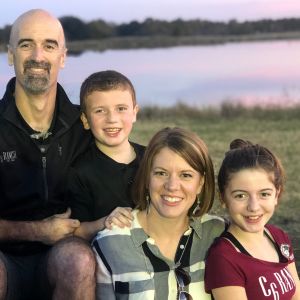Last week I had the opportunity to hop over to Leigh Power’s site and share about my ongoing struggle with perfectionism. Today, I’m super-excited that Leigh is joining us over here. Leigh Powers is a pastor’s wife, Bible study and devotional writer, freelance editor, and mother of three from small-town West Texas. She is passionate about helping women find hope and healing by encountering God in his Word. You can usually find her either with a book or knitting needles in her hand, and sometimes both. You can connect with Leigh on Facebook or Twitter, or read more of her writings at her blog: http://www.leighpowers.com/
I found out one day I’d offended someone because I hadn’t waved at her in the grocery store. I honestly didn’t see her. I was shopping with all three kids on the day in question, which means I’m lucky to see the loaf of bread I’m hunting for in between trying to navigate all the “help” they give me. But she was convinced I’d looked right at her and ignored her. Thankfully someone clued me in, and I was able to call her and talk it out.
That experience challenged me to think about the ways I ascribe motives to other people. Someone gives me a strange look, so she doesn’t like me. The pastor didn’t shake my hand Sunday, so he’s unfriendly. The women’s Bible study leader didn’t return my call, so she’s not interested in my idea. The group stopped talking when they came into the room, so they must have been talking about me.
But I’m not a good mind reader. Though I might be able to see people’s behaviors and expressions, it’s dangerous to assume I know the reasons behind them. Maybe the woman with the strange expression just remembered she put dinner in the slow cooker but didn’t turn it on. The pastor isn’t shaking hands because he has a cold. The Bible study leader’s toddler dropped her phone in the sink, and the group that stopped talking was encouraging a friend going through a tough personal situation she wasn’t ready for the world to hear.
What if instead of believing the worst about each other, we tried believing the best? In 1 Corinthians 13:7, Paul reminds us that love “always protects, always trusts, always hopes, always perseveres” (NIV). We read these words a lot at weddings, but we sometimes forget Paul first wrote them to a struggling, conflict-ridden church. The church at Corinth had issues. They were dividing into factions, quarreling over spiritual gifts, abusing the Lord’s Supper, dragging one another into court, and one man was sleeping with his father’s wife. And as Paul dealt with their multitude of issues, he reminded them what loving one another well looks like.
Part of loving one another well is guarding how we think about each other. I believe choosing to believe the best instead of the worst about people is part of that. Assuming someone’s actions are due to the worst possible explanation or motive is not protecting, trusting, hoping, or persevering. But hoping for the best, reserving judgment until we have more information, and respectfully talking things out can be. It’s not that we should be naïve or put ourselves in vulnerable situations, but many times we are better off asking instead of assuming: “Hey, I saw you in the grocery store and you seemed a little preoccupied. Everything okay?” “I just wanted to follow-up because I hadn’t heard back from you. Did you get my message?” Instead of rushing to judgment, we ought to be quick to offer grace.
Offering grace and believing the best about each other is one aspect of loving each other well. We all need grace on our bad days. Why not extend that to others? When something goes wrong in a relationship, don’t rush to judgment. Avoid assuming you know people’s motives. Give grace. Believe the best, and ask questions to clarify. Loving each other by believing the best instead of the worst helps us protect, trust, hope, and persevere.























